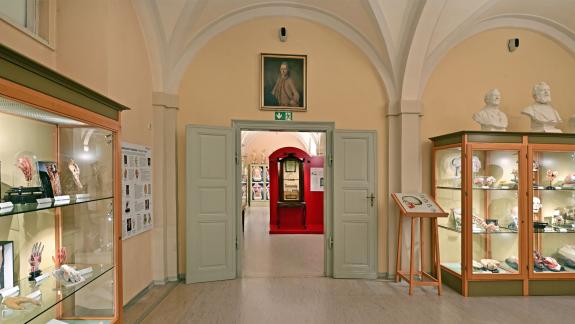The teaching and research collection of the Jena Anatomy Department, which has existed for over 200 years, is housed in two rooms that belong to the historically oldest building of the university, the Collegium Jenense, a former Dominican monastery. The permanent exhibition of the collection is managed by the Institute of Anatomy. It has been open to the general public since June 2022.
In the so-called Rolfinck Hall at the front, human anatomy is explained according to organ systems. Selected exhibits can unfold their full effect in newly designed showcases, which will also be enhanced by new LED lighting installed in 2021. Modern plastinated specimens that have been produced at the Institute of Anatomy in recent years can also be seen here. They are complemented by historical dry specimens and anatomical models. This room meets the interest in the anatomy of the human body and is particularly suitable for teaching purposes. A special area provides information on various dissection techniques. The question of the origin of anatomical cadavers at different times is also examined in detail.
In the second exhibition room, named after Goethe, the historical significance of the anatomical collection can be experienced. Here you can see the oldest specimens from the founding period as well as exhibits reminiscent of Johann Wolfgang von Goethe's comparative anatomical studies, for example the intermaxillary bone. The later history of the collection and the "Raçen skull" collection established around 1857 are also on display. A second major focus of the exhibition in this room is on the historical model collection. A variety of anatomical models are on display, including artistic wax model series on embryology.
Please note: Body parts of deceased people are shown in the exhibition, we ask you to behave respectfully.
Restrictions: Children up to the age of 12 must be accompanied by an adult. There may be waiting times if there is a large crowd.
Homepage of the Anatomical Collection

